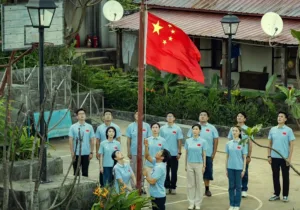If one wishes to help the environment, purchasing a hybrid or electric vehicle sounds like the virtuous thing to do. Numerous countries seem to think so—by 2032, the Scottish government intends to phase out gas and diesel cars; in the UK, they will be phased out by 2040. Big car manufacturers in the US would like to see us moving a similar direction as well, with Tesla releasing the first mass-market all-electric vehicle this year, and Chevy following closely behind with production of the Bolt.
There’s just one little catch, though. While more and more governments and consumers are pushing for environmentally friendly cars, they are painfully ignorant that the elements necessary for the so-called “clean energy” of hybrid automobiles may very well have dirty sources. The signature ingredient in the lithium-ion batteries that are in used electric and hybrid cars—as well as smartphones—is cobalt. Sixty-five percent of the world’s cobalt supply comes from the Democratic Republic of Congo, 20 percent of which is sourced from informal mines. In these “artisanal” mines, regulations on mining practices are lacking, resulting in the prevalence of unsafe working conditions and underage labor in the industry. Extreme poverty in the region, which ranks in the bottom 15 countries worldwide in the UN’s Development Index, drives adults and children alike to work in these mines.
In 2014, UNICEF estimated that 40,000 children were part of the underage cobalt mining industry in Congo; but experts from Amnesty International believe that this number has likely grown in recent years due to the increased demand for cobalt. Burgeoning demand has yielded price increases of 180 percent in the past three years, a trend that is only projected to intensify. (Bloomberg New Energy Finance estimates that the demand for cobalt will triple from 2017 to 2030; Darton Commodities estimates it will nearly septuple by that date.)
Amnesty International relates that they discovered children as young as seven laboring in the cobalt mines, though an investigation from Sky News reports finding children even younger—down to four years old. Some even drop out of school to work in the mines—or work in order to pay fees to attend school. (Although school is allegedly “free” in the region, extra fees for supplies and teachers’ pay make it impossible for some children to attend.)
Most child workers sort pieces of ore from the rubble above ground, though reports of children toiling in the depths are not unheard of. Inside the mines, fatalities may result from landslides or suffocation. Even above ground, however, conditions may be perilous with children working in holes subject to collapse or carrying heavy loads. Moreover, some mine owners do not have scales but simply estimate the weight of loads in order to pay the children less than the adults.
With no protective gear, child cobalt laborers and adult mine workers fall victim to a whole host of medical conditions—including the possibly fatal hard metal lung disease (contracted after cobalt dust inhalation), and dermatitis resulting from skin contact with cobalt. One man interviewed by reporters from the Sky News investigation blames the town’s cobalt-contaminated water supply for the growth of a gargantuan tumor on his throat. A village doctor also told the reporters that he believed cobalt contamination in the town’s water supply was responsible for strange illnesses and infections suffered by children and infants in the area and for weakness in mothers.
It’s easy to see that this is an ethical problem. What has not been so easy is figuring out how exactly to solve it due to multiple links in the supply chain. Many companies acquire their cobalt from refiners or smelters, who may or may not have received it from artisanal mines, and often do not ask questions about whether child or unfair labor was involved in the procurement of the cobalt. As the largest refiner of cobalt, China is home to many of these “upstream” companies, which primarily source their raw cobalt from artisanal mines and often have no qualms about purchasing minerals mined by children. For example, just this past May, reporters in an investigation from CBS News offered to sell a truckload of cobalt to purchasers from Congo Dongfang mining, a subsidiary of cobalt refining giant Huayou Cobalt Co., and no questions were asked as to whether child labor was used in its procurement.
Knowledge of the problem, as well as calls for reform, are no new phenomenon. In 2012, the Organization for Economic Cooperation and Development (OECD) released a due diligence guide for responsible mineral sourcing. Amnesty International first released a report of the horrendous abuses in 2016, but any substantive steps toward ameliorating the problem have only begun in the last year or so. (Apple, for instance, has allegedly stopped purchasing from artisanal mines.) Furthermore, despite corporations’ insistence that they are putting due diligence policies into practice, Amnesty International related in their report at the end of 2017, and confirms now, that despite improvements, almost all of these companies are not doing enough to ensure the refiners and smelters they purchase from are not tainted by child labor. More transparency and evidence of concrete measures taken toward risk mitigation are still needed.
Congo is not the only place to get cobalt. New mining locations are being cultivated, and new ways of sourcing cobalt are also being explored, such as recycling. While any of these options might be able to replace a portion of Congo’s production, none offers a viable alternative to the cobalt market share. Concerning alternative mining locations, the runners-up to Congo in the cobalt supplying business—China and Canada—produce a small fraction of the cobalt Congo does. (Congo produces eight times as much cobalt as China, and nine times as much as Canada does!) Realistically, it would be difficult to completely source cobalt from other countries.
Attempting to replace the Congolese cobalt market does not necessarily solve all ethical dilemmas; refusing to buy from artisanal mines altogether would likely have ill effects on the population in Congo, many of whom are in poverty and depend on the mines as a vital source of income.
Major corporations that are purchasers of cobalt should, at the very least, establish more robust structures to ensure risk mitigation in their supply chains, as well as identify and release the identities of their refiners and smelters. They could also use their power to demand better working conditions or attempt to purchase directly from artisanal mines to more effectively ensure that child labor is not being used. Apple and Samsung have reportedly been attempting to do so, but no agreements have been finalized. And car manufacturers have yet to make such an attempt. Training programs for children to work in safer professions, such as those that Apple has begun, could also keep families out of poverty while ensuring children’s safety.
The global electric car push is just one example of countless seemingly simple yet multifaceted issues that must be faced today. At first glance, moving toward all-electric cars seems like a clearly desirable solution to pollution problems. Who wouldn’t want to minimize their carbon footprint and feel a little bit better about their impact on the earth? But further research into the subject reveals that, as it currently stands, the human cost of this “solution” makes it ethically more objectionable than the widely proposed alternative. While the biblical mandate to act as faithful stewards of the earth is important, it must be pursued in a way that also honors the dignity of the human person as made in the image of God.
Although no one has the time to research every issue, Christians should strive to know as much as possible about the decisions they make, and the products they purchase, and not settle for easy solutions. No one should be too busy to do the right thing. Ethical issues are rarely simple and must be navigated with discernment. Too often, Christians comfort themselves with cheap piety; they take a simplistic approach to complex problems and come up with solutions before fully knowing the facts. In determining policy, it is necessary to consider not only the potential effectiveness of possible solutions, but also the possibility of collateral damage and how it may best be minimized.
—
Alexandra Nieuwsma graduated summa cum laude from Westmont College with a B.A. in political science. She currently works as a research assistant for Senior Fellow and George P. Shultz Distinguished Scholar Abraham Sofaer at the Hoover Institution at Stanford. In 2018, Alexandra began her residency as a fellow at the John Jay Institute. Alexandra was named the Outstanding Senior 2017 in Westmont’s Political Science department. She is also a member of Phi Kappa Phi National Honor Society, and Pi Sigma Alpha National Honor society. When she’s not researching or writing, Alexandra enjoys playing the harp and composing music.
Photo Credit: Adult and child workers at a mine in Kailo Territory, Democratic Republic of Congo. By Julien Harneis, via Flickr.







 Sponsor a student for Christianity & National Security 2024
Sponsor a student for Christianity & National Security 2024